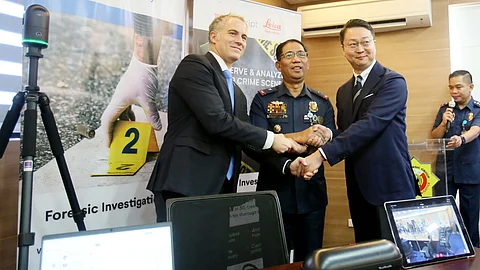
- NEWS
- the EDIT
- COMMENTARY
- BUSINESS
- LIFE
- SHOW
- ACTION
- GLOBAL GOALS
- SNAPS
- DYARYO TIRADA
- MORE

The United Nations Office on Drugs and Crime (UNODC), in partnership with the government of Japan, handed over three-dimensional (3D) crime scene laser scanning and mapping equipment to the Philippine National Police (PNP) on Friday.
PNP Forensic Group chief, PBGen. Benjamin Sembrano, and UNODC Country Manager Fanirle Marchesi signed the acknowledgment receipt for the Forensic Investigation 3D Laser Scanner in a handover ceremony at Camp Crame in Quezon City.
“Today’s handover and demonstration of the Forensic Investigation 3D Laser Scanner symbolizes not just our partnership, but likewise cements our shared commitment and deeper understanding about our role as peacekeepers and agents of truth and justice against the backdrop of a fluid, labile, evolving, and complex criminality as well as illegal narcotics and substance trade that thus become a global phenomenon in scale and breed,” Sembrano said.
Sembrano said the 3D laser scanner, the first for the organization, will enable the PNP’s forensic investigators to capture every detail of a crime scene, including the original state of the evidence, location, its measurements, and evidence patterns.
“This apparatus will capture immediate and surrounding details of crime scenes, such that the correlation, association, and evaluation of evidence will be preserved and documented before the processing comes to form, hence fostering transparency, authenticity, and credibility,” he said.
This latest technology is seen to enhance law enforcement’s capability to address security threats posed by terrorists and violent extremism.
Also, Sembrano said the 3D scanner will improve the PNP’s ability to document and reconstruct complex crime scenes, particularly those involving terrorism by capturing accurate and detailed images crucial to investigations and legal proceedings.
According to Sembrano, the PNP is eyeing four more 3D forensic scanners, each costing around US$62,000.
For his part, UNODC country manager and program officer in the Philippines, Daniele Marchesi, said the provision of a 3D forensic scanner is the Japanese government’s support for the UNODC’s regional initiative dubbed “Supporting Member States in Southeast Asia to Strengthen their Immediate Responses to Crises and Security Concerns.”
